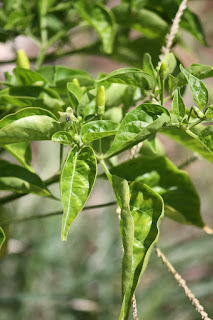One of the plants I really wanted to find on my trip to Hawaii is known as the Hawaiian Pepper. This semi-wild pepper plant is generally referred to as a type of Capsicum frutescens, though you will often find references to it as different varieties of C. annuum. The ancestors of these chiles were first introduced to the islands around 1815, but they have since been integrated into the local culture and are often described as native. The small size and non-aggressive growth of the plants has allowed them to integrate into the island ecosystem without being too disruptive. Like other wild peppers around the world, birds also help distribute the seeds.
You can order seeds for it (I have no affiliation with the linked company, but found them via a quick search.), but I wanted to find the species growing wild on the islands.
 The plants I found were... not exactly growing wild. As I walked along part of the resort where we were attending a conference, I glanced through a gap in some hedges and saw the characteristic look of chile plants. When I walked around behind the hedges, I found what looked like a little guerrilla garden someone had setup outside the watered and maintained landscaping of the resort. There were several Hawaiian Pepper plants of about the same age/size spaced about the area. I suspect someone who works on the resort planted them and would go by every now and again to tend to them.
The plants I found were... not exactly growing wild. As I walked along part of the resort where we were attending a conference, I glanced through a gap in some hedges and saw the characteristic look of chile plants. When I walked around behind the hedges, I found what looked like a little guerrilla garden someone had setup outside the watered and maintained landscaping of the resort. There were several Hawaiian Pepper plants of about the same age/size spaced about the area. I suspect someone who works on the resort planted them and would go by every now and again to tend to them.
I collected a few dried pods that had dropped to the ground around the plants. I didn't grow any this year, but I did send some seeds to a collaborator out in California. (They're on twitter as @ChaoticGenetics. Go check them out!) Last I heard the plants were growing well.
References
You can order seeds for it (I have no affiliation with the linked company, but found them via a quick search.), but I wanted to find the species growing wild on the islands.
 The plants I found were... not exactly growing wild. As I walked along part of the resort where we were attending a conference, I glanced through a gap in some hedges and saw the characteristic look of chile plants. When I walked around behind the hedges, I found what looked like a little guerrilla garden someone had setup outside the watered and maintained landscaping of the resort. There were several Hawaiian Pepper plants of about the same age/size spaced about the area. I suspect someone who works on the resort planted them and would go by every now and again to tend to them.
The plants I found were... not exactly growing wild. As I walked along part of the resort where we were attending a conference, I glanced through a gap in some hedges and saw the characteristic look of chile plants. When I walked around behind the hedges, I found what looked like a little guerrilla garden someone had setup outside the watered and maintained landscaping of the resort. There were several Hawaiian Pepper plants of about the same age/size spaced about the area. I suspect someone who works on the resort planted them and would go by every now and again to tend to them.I collected a few dried pods that had dropped to the ground around the plants. I didn't grow any this year, but I did send some seeds to a collaborator out in California. (They're on twitter as @ChaoticGenetics. Go check them out!) Last I heard the plants were growing well.
References

No comments:
Post a Comment